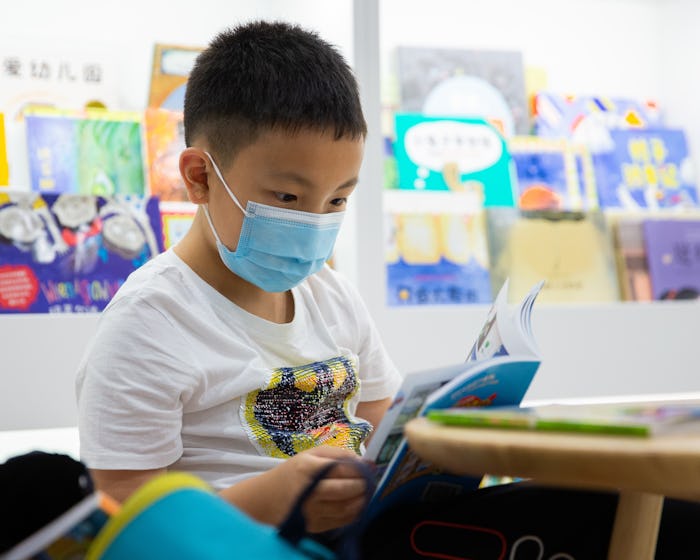Life

Here's What The Experts Say About Whether Coronavirus Can Live On Books
While the days of wiping down groceries seem to be behind us, there are still so many questions about how long the virus remains on surfaces. With the start of school just around the corner and libraries across the country beginning to open up, parents are forced to contend with yet another concern related to the transmission of COVID-19: Can coronavirus live on books?
In June, research conducted by The Institute of Museum and Library Services as part of the Reopening Archives, Libraries, and Museums (REALM) project found the virus undetectable "after one day on the covers of hardback and softback books as well as the DVD case” and after three days on the "paper inside of a book and mylar book jackets." Does that mean books need to go into quarantine for a few days when they're returned to the library or after reading time at school?
Probably not. "The fact that coronavirus can survive on surfaces for several hours is not enough alone to lead to transmission of infection," Emily Sickbert-Bennett Ph.D., Director of Infection Prevention, UNC Hospitals, tells Romper in an email. It's important to remember that all germs can survive for variable amounts of times on various surfaces, she adds, but "the entire chain of transmission" needs to take place before an infection via surface contamination can happen. As explained by Dr. Sickbert-Bennett, that "chain of transmission" looks something like this:
- An infected individual contaminates a surface of with their own droplet aerosols.
- The virus on the surface survives, remaining capable of causing infection (this is subject to environmental conditions such as time, temperature, humidity, and UV exposure).
- Someone susceptible touches the exact location that was contaminated, where viable virus remains.
- Enough viable virus transfers to the person’s hand at a dose large enough to cause an infection.
- The person’s contaminated hand "inoculates" their own nose or mouth while still contaminated (before hand washing/sanitizing).
- Enough viable virus transfers to the person’s nose/mouth to be capable of causing an infection.
“Is it possible that COVID could be transmitted by a book to a person? The question is, is that biologically possible? The answer is yes,” William Schaffner, M.D., Professor of Preventive Medicine in the Department of Health Policy and Professor of Medicine in the Division of Infectious Diseases at the Vanderbilt University School of Medicine tells Romper in an email.
"But, does it occur with any frequency? In fact, has it ever been documented? There’s not a single research study that’s reported that. So, is it likely to be frequent and substantially transmitted? No.”
If you're worried about libraries or book-sharing, Dr. Shaffner recommends running a disinfectant wipe it over the external surface of the book very quickly and washing hands thoroughly.
“Even if this virus were in low concentrations on the surface of the book, the virus is not gonna jump off and bite you,” Dr. Schaffner says. “If you touch the book and wash your hands, you’ll be okay.”
"The key interrupter in the chain of transmission is handwashing — in particular before touching nose and mouth," agrees Dr. Sickbert-Bennett. "Mask use is also important in that way in that it blocks you from inadvertently touching your nose and mouth with potentially contaminated hands."
In other words, wash your hands, wear a mask and keep reading.
If you think you’re showing symptoms of coronavirus, which include fever, shortness of breath, and cough, call your doctor before going to get tested. If you’re anxious about the virus’s spread in your community, visit the CDC for up-to-date information and resources, or seek out mental health support. You can find all of Romper’s parents + coronavirus coverage here.
Experts:
William Schaffner, M.D., Professor of Preventive Medicine in the Department of Health Policy and Professor of Medicine in the Division of Infectious Diseases at the Vanderbilt University School of Medicine
Emily Sickbert-Bennett, Ph.D., Director of Infection Prevention, UNC Hospitals
Studies:
Reopening Archives, Libraries, and Museums (REALM) Information Hub: A Covid-19 Research Project